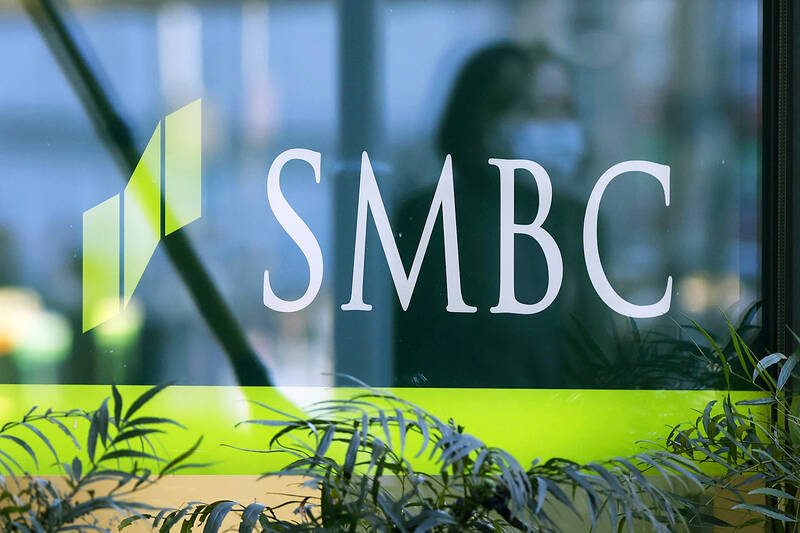Sumitomo Mitsui Banking Corp (SMBC) plans to phase out corporate and project finance exposure to coal mining by 2040, although it does not have a concrete timeline for reducing support to trade finance, a senior company official said yesterday.
The main banking arm of Sumitomo Mitsui Financial Group said in disclosures to investors last year that it would halt funding for new mines, expansion of existing ones and related infrastructure, but stopped short of providing a timeline to end corporate finance for companies linked to coal mining.
The bank would have no project or corporate finance exposure to coal mining and coal-fired power plants by 2040, SMBC managing executive officer and cohead of Asia-Pacific division Rajeev Kannan said

Photo: Bloomberg
Critics have previously pointed to the ambiguity on corporate financing potentially providing a loophole to banks lending to pure-play coal miners.
However, “some level of trade finance” could still be available for coal dealers shipping critical fuel supplies for power plants, Kannan said in an interview with Reuters.
“But even that kind of support, over a period of time, will go away,” he said.
Environmental advocates are increasingly pushing Japanese megabanks away from investing in or financing fossil fuels such as coal, which still has strong support in Japan. All the country’s banks have committed to stop lending to new coal-fired power plants.
Japan’s second-largest bank by assets was getting most of its new energy funding opportunities in the renewable energy sector, followed by hydrogen, Kannan said, adding that the group would progressively reduce exposure to gas-related transactions.
Kannan said decisions on offering financial support to carbon capture were “not easy” as it would still mean developing a coal-based utility, but called ammonia cofiring a “good option” provided that power generated from coal was quickly displaced by ammonia.
“Big picture, we are focused on our finance emissions targets,” he said. “We’ll have to see how does the portfolio reduce the total quantum of finance emissions over a period of time.”

UNCERTAINTY: Innolux activated a stringent supply chain management mechanism, as it did during the COVID-19 pandemic, to ensure optimal inventory levels for customers Flat-panel display makers AUO Corp (友達) and Innolux Corp (群創) yesterday said that about 12 to 20 percent of their display business is at risk of potential US tariffs and that they would relocate production or shipment destinations to mitigate the levies’ effects. US tariffs would have a direct impact of US$200 million on AUO’s revenue, company chairman Paul Peng (彭雙浪) told reporters on the sidelines of the Touch Taiwan trade show in Taipei yesterday. That would make up about 12 percent of the company’s overall revenue. To cope with the tariff uncertainty, AUO plans to allocate its production to manufacturing facilities in

Taiwan will prioritize the development of silicon photonics by taking advantage of its strength in the semiconductor industry to build another shield to protect the local economy, National Development Council (NDC) Minister Paul Liu (劉鏡清) said yesterday. Speaking at a meeting of the legislature’s Economics Committee, Liu said Taiwan already has the artificial intelligence (AI) industry as a shield, after the semiconductor industry, to safeguard the country, and is looking at new unique fields to build more economic shields. While Taiwan will further strengthen its existing shields, over the longer term, the country is determined to focus on such potential segments as

TAKING STOCK: A Taiwanese cookware firm in Vietnam urged customers to assess inventory or place orders early so shipments can reach the US while tariffs are paused Taiwanese businesses in Vietnam are exploring alternatives after the White House imposed a 46 percent import duty on Vietnamese goods, following US President Donald Trump’s announcement of “reciprocal” tariffs on the US’ trading partners. Lo Shih-liang (羅世良), chairman of Brico Industry Co (裕茂工業), a Taiwanese company that manufactures cast iron cookware and stove components in Vietnam, said that more than 40 percent of his business was tied to the US market, describing the constant US policy shifts as an emotional roller coaster. “I work during the day and stay up all night watching the news. I’ve been following US news until 3am

COLLABORATION: Given Taiwan’s key position in global supply chains, the US firm is discussing strategies with local partners and clients to deal with global uncertainties Advanced Micro Devices Inc (AMD) yesterday said it is meeting with local ecosystem partners, including Taiwan Semiconductor Manufacturing Co (TSMC, 台積電), to discuss strategies, including long-term manufacturing, to navigate uncertainties such as US tariffs, as Taiwan occupies an important position in global supply chains. AMD chief executive officer Lisa Su (蘇姿丰) told reporters that Taiwan is an important part of the chip designer’s ecosystem and she is discussing with partners and customers in Taiwan to forge strong collaborations on different areas during this critical period. AMD has just become the first artificial-intelligence (AI) server chip customer of TSMC to utilize its advanced